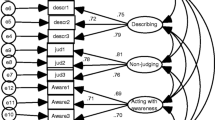Abstract
The present study examines the relationships between mindfulness and rumination, repetitive negative thinking, and depressive symptoms, employing a newly developed paradigm for the assessment of mindfulness. Derived from a central exercise of mindfulness-based interventions, 42 undergraduates were asked to observe their breath for about 18 min. Within this time period, they were prompted 22 times at irregular intervals to indicate whether they had lost mindful contact with their breath as a result of mind wandering. The results show negative correlations between the degree of the ability to stay mindfully in contact with the breath and measures of rumination, repetitive negative thinking, and depression. Moreover, positive associations with self-report data of mindfulness and a negative relationship to fear of bodily sensations support the construct validity of our new approach for the assessment of mindfulness. In summary, findings suggest the healthy quality of mindful breathing regarding depression-related processes.
Similar content being viewed by others
References
Baer, R. A., Smith, G. T., & Allen, K. B. (2004). Assessment of mindfulness by self-report: The Kentucky inventory of mindfulness skills. Assessment, 11, 191–206.
Baer, R. A., Smith, G. T., Hopkins, J., Krietemeyer, J., & Toney, L. (2006). Using self-report assessment methods to explore facets of mindfulness. Assessment, 13, 27–44.
Chambless, D. L., Caputo, G. C., Bright, P., & Gallagher, R. (1984). Assessment of fear of fear in agoraphobics: The body sensations questionnaire and the agoraphobic cognitions questionnaire. Journal of Consulting and Clinical Psychology, 52, 1090–1097.
Cohen, R. J. (2005). Psychological testing and assessment: An introduction to tests and measurement. Boston, MA: McGraw-Hill.
Ehlers, A., & Margraf, J. (1993). Fragebogen zu körperbezogenen Ängsten, Kognitionen und Vermeidung. Weinheim: Beltz Test.
Ehlers, A., Mayou, R., Sprigings, D. C., & Birkhead, J. (2000). Psychological and perceptual factors associated with arrhythmias and benign palpitations. Psychosomatic Medicine, 62, 693–702.
Ehring, T., Zetsche, U., Weidacker, K., Wahl, K., Schönfeld, S. & Ehlers, A. (submitted). The perseverative thinking questionnaire (PTQ): Development and initial validation of a content-independent measure of repetitive negative thinking.
Eisendrath, S. J., Delucchi, K., Bitner, R., Fenimore, P., Smit, M., & McLane, M. (2008). Mindfulness-based cognitive therapy for treatment-resistant depression: A pilot study. Psychotherapy and Psychosomatics, 77, 319–320.
Eley, T. C., Stirling, L., Ehlers, A., Gregory, A. M., & Clark, D. M. (2004). Heart-beat perception, panic/somatic symptoms and anxiety sensitivity in children. Behaviour and Research Therapy, 42, 439–448.
Farb, N. A. S., Anderson, A. K., Mayberg, H., Bean, J., McKeon, D., & Segal, Z. V. (2010). Minding one’s emotions: mindfulness training alters the neural expression of sadness. Emotion, 10, 25–33.
Grossman, P. (2008). On measuring mindfulness in psychosomatic and psychological research [Invited commentary]. Journal of Psychosomatic Research, 64, 405–408.
Hautzinger, M., & Bailer, M. (1993). ADS. Allgemeine Depressions Skala. Center for Epidemiological Studies Depression Scale (CES-D; Radloff, L. S., 1977)—German adaptation/zpid. Göttingen: Beltz Test.
Kabat-Zinn, J. (1990). Full catastrophe living: The program of the Stress Reduction Clinic at the University of Massachusetts Medical Center. New York: Delta.
Kessler, R. C., & Wang, P. S. (2009). Epidemiology of depression. In I. H. Gotlib & C. L. Hammen (Eds.), Handbook of depression (2nd ed.). New York: Guilford Press.
Kuehner, C., Huffziger, S., & Nolen-Hoeksema, S. (2007). Response Styles Questionnaire–German version (RSQ-D). Goettingen: Hogrefe.
Kuyken, W., Byford, S., Taylor, R. S., Watkins, E., Holden, E., & White, K. (2008). Mindfulness-based cognitive therapy to prevent relapse in recurrent depression. Journal of Consulting and Clinical Psychology, 76, 966–978.
Lykens, E. L., & Baer, R. A. (2009). Psychological functioning in a sample of long-term practitioners of mindfulness meditation. Journal of Cognitive Psychotherapy: An International Quarterly, 23, 226–241.
Ma, S. H., & Teasdale, J. D. (2004). Mindfulness-based cognitive therapy for depression: Replication and exploration of differential relapse prevention effects. Journal of Consulting and Clinical Psychology, 72, 31–40.
Michalak, J., Hölz, A., & Teismann, T. (in press). Rumination as a predictor of relapse in mindfulness-based cognitive therapy for depression. Psychology and Psychotherapy: Theory, Research and Practice.
Michalak, J., Troje, N. F., & Heidenreich, T. (2010). Embodied effects of mindfulness-based cognitive therapy. Journal of Psychosomatic Research, 68, 311–314.
Nolen-Hoeksema, S. (1991). Responses to depression and their effects on the duration of depressive episodes. Journal of Abnormal Psychology, 100, 569–582.
Nolen-Hoeksema, S., & Morrow, J. (1991). A prospective study of depression and posttraumatic stress symptoms after a natural disaster: The 1989 Loma Prieta Earthquake. Journal of Personality and Social Psychology, 61, 115–121.
Nolen-Hoeksema, S., Wisco, B. E., & Lyubomirsky, S. (2008). Rethinking rumination. Perspectives on Psychological Science, 3, 400–424.
Radloff, L. S. (1977). The CES-D scale: A self-report depression scale for research in the general population. Applied Psychological Measurement, 3, 385–401.
Segal, Z. V., Williams, J. M., & Teasdale, J. D. (2002). Mindfulness-based cognitive therapy for depression–A new approach to preventing relapse. New York: Guilford Press.
Stroehle, G., Nachtigall, C., Michalak, J., & Heidenreich, T. (2010). Die Erfassung von Achtsamkeit als mehrdimensionales Konstrukt: Die deutsche Version des Kentucky Inventory of Mindfulness Skills (KIMS-D). Zeitschrift für Klinische Psychologie und Psychotherapie, 39, 1–12.
Teasdale, J. D., Segal, Z. V., Williams, J. M. G., Ridgeway, V. A., Soulsby, J., & Lau, M. A. (2000). Prevention of relapse/recurrence in major depression by mindfulness-based cognitive therapy. Journal of Consulting and Clinical Psychology, 68, 615–623.
Treynor, W., Gonzalez, R., & Nolen-Hoeksema, S. (2003). Rumination reconsidered: A psychometric analysis. Cognitive Therapy and Research, 27, 247–259.
Acknowledgments
This study was supported by a Ph.D. Fellowship awarded to Jan Burg by the Studienstiftung des deutschen Volkes, and in part by German Science Foundation Grant DFG: Mi 700/4-1 awarded to Johannes Michalak.
Author information
Authors and Affiliations
Corresponding author
Rights and permissions
About this article
Cite this article
Burg, J.M., Michalak, J. The Healthy Quality of Mindful Breathing: Associations With Rumination and Depression. Cogn Ther Res 35, 179–185 (2011). https://doi.org/10.1007/s10608-010-9343-x
Published:
Issue Date:
DOI: https://doi.org/10.1007/s10608-010-9343-x




